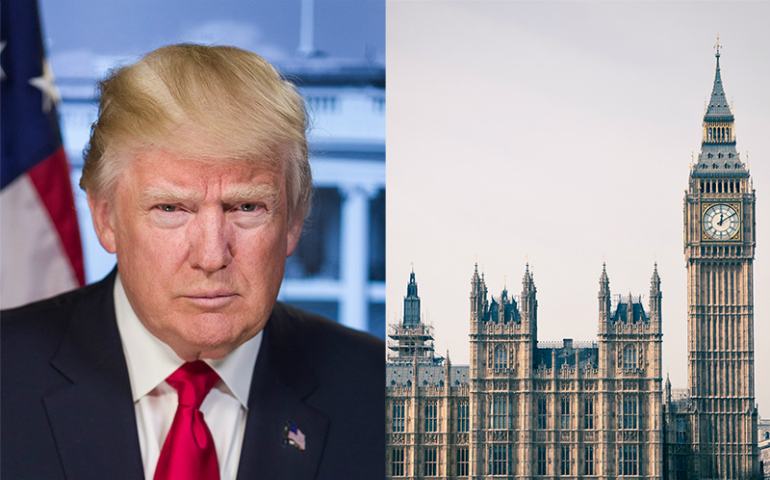
President Trump, left, and the Houses of Parliament in central London. (Creative Commons)
As civil liberties advocates in the U.S. criticize President Trump’s reference to “honor killings” in a new travel ban, saying it smears and targets Muslims, one Muslim member of the U.K.’s Parliament is acting on separate concerns that the phrase legitimizes rape and murder.
In January, Conservative Member of Parliament Nusrat Ghani proposed a bill in the House of Commons that would prohibit use of the term “honour killing” in official publications.
“Language matters. The use of the term ‘honour’ to describe a violent criminal act … can be explained only as a means of self-justification for the perpetrator. It diminishes the victim and provides a convenient excuse for what in our society we should accurately and simply call murder, rape, abuse or enslavement,” Ghani said when introducing her crime-against-women bill Jan. 31.
Between 2010 and 2014, police in the U.K. recorded 11,744 cases of so-called honor crimes, illegal acts ostensibly committed to protect or restore the reputation of a family or community.
This number includes 29 so-called honor killings or attempted killings in the U.K. along with instances of forced marriage, female genital mutilation and rape.
A 2014 report funded by the U.S. Department of Justice estimates that between 23 and 27 so-called honor killings occur annually in the U.S. Those numbers come with a host of caveats:
“Information about honor violence is held tightly within families. Victims or potential victims may not report victimization because of concern about an extremely negative family response. Moreover, victims may not report information because in their home cultures what has happened is not viewed as a crime,” the report states.
While some critics consider Trump’s use of “so-called ‘honor killings’” in the latest executive order an attempt to politicize such crimes in America, some MPs in the U.K. see use of the phrase as its own form of “dangerous political correctness.”
Conservative MP Philip Davies, who opposed Ghani’s proposed crime bill because of its gender-specific title and framing, nevertheless agreed with what he described as her “wish to tackle the politically correct culture that sometimes surrounds certain cultures in this country and which can be very damaging to those caught up in them.”
In Ghani’s own words, “the term assumes that violence, in particular against women, is culturally sensitive — a sensitivity that allows the perpetrator to use further coercion to prevent the victim from seeking help and to intimidate the agencies of the state to stop them from pursuing and prosecuting these violent crimes.”
She accuses U.K. law enforcement officials of being “reluctant to tackle domestic violence in minority communities for fear of being accused of racism or of provoking community unrest.”
Although so-called honor killings are often affiliated with Islam in media reports and popular perception, Rosemary Gartner and Bill McCarthy, editors of “The Oxford Handbook of Gender, Sex, and Crime,” say such crimes existed in pre-Islamic tribal traditions and are not part of Shariah.
They cite research from Dietrich Oberwittler and Julia Kasselt at the Max Planck Institute for Foreign and International Criminal Law in Germany, which documented so-called honor killings among global Christian and Sikh communities and noted a near absence of such crimes in Muslim-majority countries including Oman, Algeria and Tunisia.
Approximately 2.8 million Muslims live in the U.K., according to recent census figures and growth rates. Nearly half of British Muslims are U.K.-born, and 68 percent are ethnically Asian or Asian British, primarily of Pakistani, Bangladeshi and Indian descent, according to a 2015 report by the Muslim Council of Britain.
In introducing her bill to Parliament, Ghani cited the case of Sarbjit Athwal, a British Sikh woman of Indian descent who told the MP she was battered and terrorized by her husband in the U.K.
“She called Crimestoppers as well as the police. … But after statements were taken, she was returned home to her abusers because it was just a ‘cultural misunderstanding,’” Ghani said of Athwal’s case.
“Sarbjit was reduced to going to a temple, falling to her knees and begging for help from community leaders. … She was sent home again and told to think of her family’s honour. She was trapped and, once she had been let down by the authorities she trusted to protect her, she had nowhere to turn.”
Athwal now runs True Honour, a U.K. charity that supports victims of “honour-based violence,” forced marriage and female genital mutilation.
In addition to prohibiting use of the term “honour killing” in official publications, Ghani’s bill, which is scheduled to have its second reading in the House of Commons on March 24, would require the U.K. government to assist in repatriating female citizens who are victims of aggravated domestic violence or murder abroad and to prosecute U.K. citizens who commit such foreign crimes.

